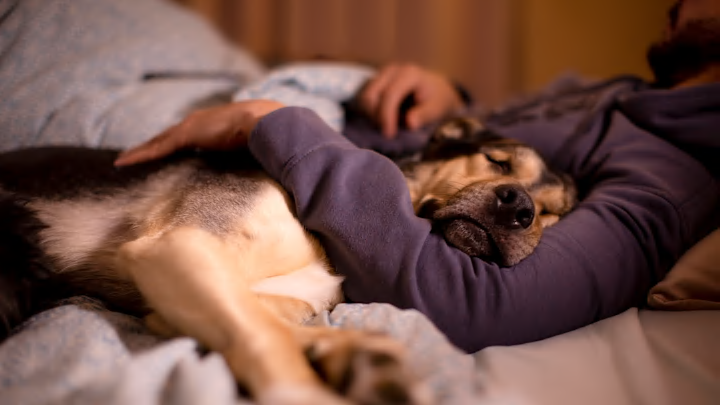In summer 2021, Fingal, Treo, Winnie, and Soot were guided into a room and asked to take a whiff of three different odor samples. The dogs were acting in the service of science, with the objective of seeing whether they could detect a sample from a stressed human.
The result probably comes as little surprise to pet owners: Dogs can indeed discern when their human companions are worked up over something.
The study, which was recently published in the journal PLOS ONE, is the latest to demonstrate that canines have a keen sense of human moods. While the sample size was rather small—just four dogs and 36 human donors—the dogs were successful in detecting when breath and sweat samples collected from a person stressed out during a difficult verbal math test was present versus a non-stressed or control sample. Together, the dogs achieved a 93.8 percent accuracy rate.
The (human) volunteers gave a baseline sample of their breath and perspiration before being asked to count backward from 9000 in units of 17. Duly burdened, they then gave another sample, which the dogs—one cocker spaniel, one cockapoo, and two mixed-breeds—identified.
It’s believed that humans emit a different composition of volatile organic compounds, or VOCs, under different emotional conditions. Increased pulse and blood pressure can confer a change in those VOCs. While humans aren't able to perceive this change, animals often can.
Dogs have long been renowned for their olfactory superiority, able to sniff out everything from drugs to cancer. Previous studies have examined whether dogs can detect fear or happiness.
The study affirms a long-held belief of pet owners that dogs can detect when something is amiss and respond with comfort, like clinging to their owner or otherwise demonstrating some sort of concern. This study didn’t examine how the dogs reacted to signs of stress, only that they’re able to sense it.
Of course, just because a dog can do something doesn’t necessarily mean they will. The study started with 20 dogs: 16 dropped out because they were either too easily distracted or bored.
[h/t Smithsonian]
